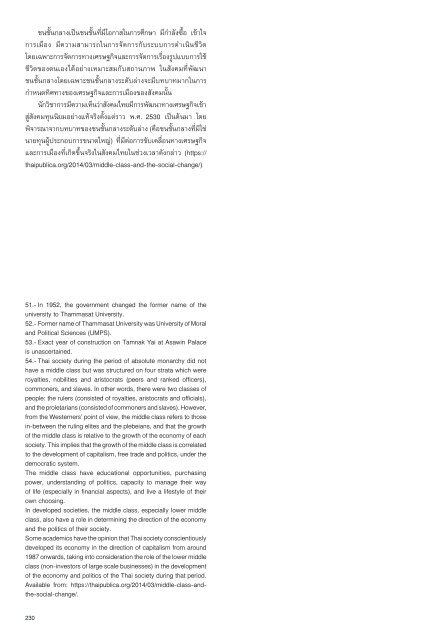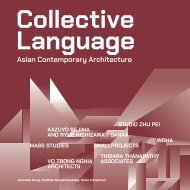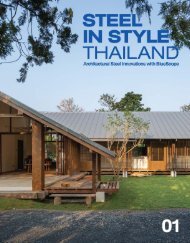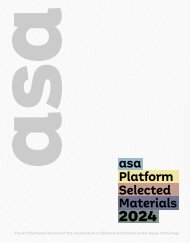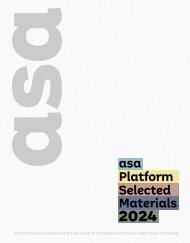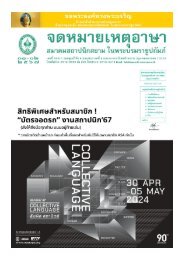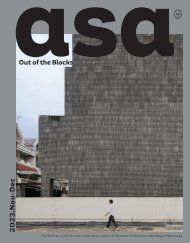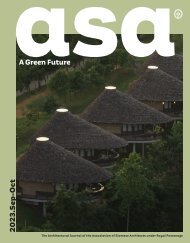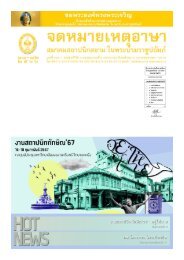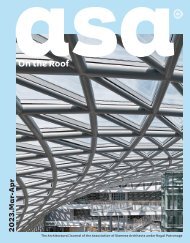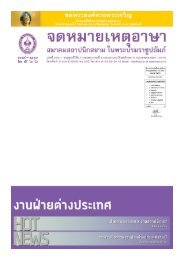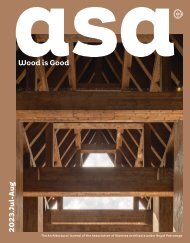บ้านเรือนถิ่นไทยในช่วงเจ็ดทศวรรษ 2489-2559
Create successful ePaper yourself
Turn your PDF publications into a flip-book with our unique Google optimized e-Paper software.
ชนชั้นกลางเป็นชนชั้นที่มีโอกาสในการศึกษา มีกำลังซื้อ เข้าใจ<br />
การเมือง มีความสามารถในการจัดการกับระบบการดำเนินชีวิต<br />
โดยเฉพาะการจัดการทางเศรษฐกิจและการจัดการเรื่องรูปแบบการใช้<br />
ชีวิตของตนเองได้อย่างเหมาะสมกับสถานภาพ ในสังคมที่พัฒนา<br />
ชนชั้นกลางโดยเฉพาะชนชั้นกลางระดับล่างจะมีบทบาทมากในการ<br />
กำหนดทิศทางของเศรษฐกิจและการเมืองของสังคมนั้น<br />
นักวิชาการมีความเห็นว่าสังคมไทยมีการพัฒนาทางเศรษฐกิจเข้า<br />
สู่สังคมทุนนิยมอย่างแท้จริงตั้งแต่ราว พ.ศ. 2530 เป็นต้นมา โดย<br />
พิจารณาจากบทบาทของชนชั้นกลางระดับล่าง (คือชนชั้นกลางที่มิใช่<br />
นายทุนผู้ประกอบการขนาดใหญ่) ที่มีต่อการขับเคลื่อนทางเศรษฐกิจ<br />
และการเมืองที่เกิดขึ้นจริงในสังคมไทยในช่วงเวลาดังกล่าว (https://<br />
thaipublica.org/2014/03/middle-class-and-the-social-change/)<br />
51.- In 1952, the government changed the former name of the<br />
university to Thammasat University.<br />
52.- Former name of Thammasat University was University of Moral<br />
and Political Sciences (UMPS).<br />
53.- Exact year of construction on Tamnak Yai at Asawin Palace<br />
is unascertained.<br />
54.- Thai society during the period of absolute monarchy did not<br />
have a middle class but was structured on four strata which were<br />
royalties, nobilities and aristocrats (peers and ranked officers),<br />
commoners, and slaves. In other words, there were two classes of<br />
people: the rulers (consisted of royalties, aristocrats and officials),<br />
and the proletarians (consisted of commoners and slaves). However,<br />
from the Westerners’ point of view, the middle class refers to those<br />
in-between the ruling elites and the plebeians, and that the growth<br />
of the middle class is relative to the growth of the economy of each<br />
society. This implies that the growth of the middle class is correlated<br />
to the development of capitalism, free trade and politics, under the<br />
democratic system.<br />
The middle class have educational opportunities, purchasing<br />
power, understanding of politics, capacity to manage their way<br />
of life (especially in financial aspects), and live a lifestyle of their<br />
own choosing.<br />
In developed societies, the middle class, especially lower middle<br />
class, also have a role in determining the direction of the economy<br />
and the politics of their society.<br />
Some academics have the opinion that Thai society conscientiously<br />
developed its economy in the direction of capitalism from around<br />
1987 onwards, taking into consideration the role of the lower middle<br />
class (non-investors of large scale businesses) in the development<br />
of the economy and politics of the Thai society during that period.<br />
Available from: https://thaipublica.org/2014/03/middle-class-andthe-social-change/.<br />
230


